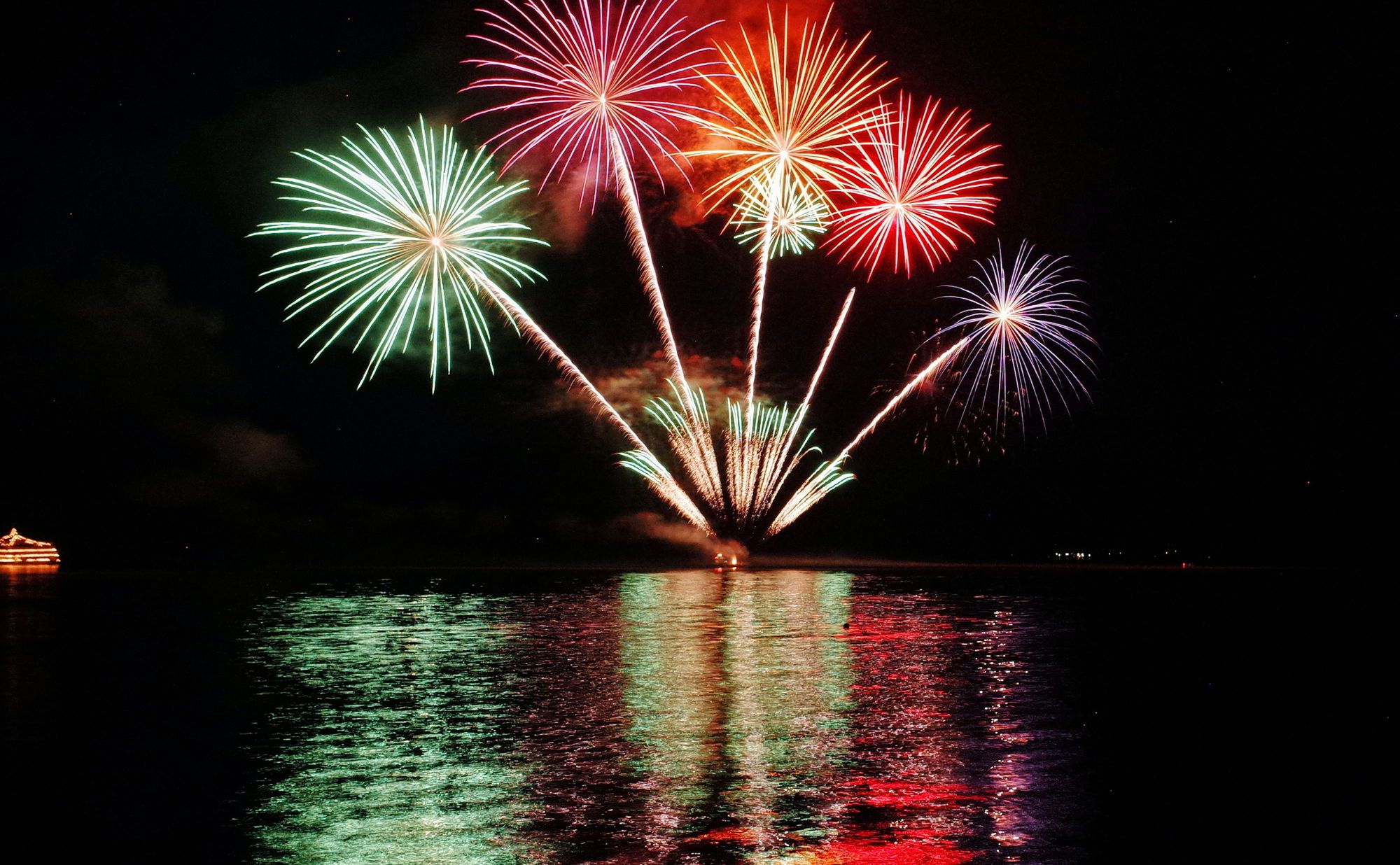Fourth of July Reflections
"Stop your non-productive whining. Yes, there has been a series of giant steps backward. It is NOT, as thousands of tweets would have you believe, “the lowest point in our nation’s history” nor “the end of our republic” nor, for that matter, is it the worst of anything in our American past."

How did I celebrate my Fourth? A mix of history research, eating leftover barbeque and trying to calm a dog terrified of the fireworks nearby slack-jaws insist on setting off. One can only hope that eventually they will lose enough fingers to render the practice moot, at least where they are concerned. And with yet more unconscionable, foreseeable and almost certainly preventable mass shootings, it was also as good a day as any other to reflect on exactly what we’ve done with 246 years of independence.
Like any other nation, presumably even Luxembourg, the good ol’ U.S. of A. has had some major crises. It is an unfortunate part of the human experience. In the four and a half months since Russia cravenly invaded Ukraine, there have been over 10,000 Ukrainian civilians killed or severely wounded, along with another 30,000 plus of their soldiers. That’s on top of the 15,000 or so who died following the previous craven Russian invasion in 2014. Not to mention the millions of refugees left to wander Eastern Europe homeless, hungry and petrified. Over those same few months, surveys indicate that most Americans deem it a crisis that average nationwide gas prices topped $4.79 a gallon. Perhaps a rational person might see a quantitative difference between those two “crises.” Do you see where I’m going with this?
This current crop of loon is far from the first anti-education whackadoodle group that have seen success on our shores. The Know-Nothings, not making it up, morphed from a secret anti-Catholic society into a legitimate political party in the 1850s. They were conspiracy theorists who were convinced that there was a clandestine Catholic conspiracy to subvert civil and religious liberty. If there had been pizza parlors in the U.S. at the time, it’s highly likely the Know-Nothings would have sworn that papists were running child porn rings out of them. Among those who embraced the bigoted Protestant movement were Sam Houston, in not his finest hour, and John Wilkes Booth, who still had a ways to fall. Sadly, for the sheer entertainment factor, the Know-Nothings rolled into the American Party. When their middle ground stance on slavery, the true crisis of the day, failed to gain traction after a cynically evil SCOTUS decision called the Dred Scott case, they mostly became anti-slavery Republicans. Some of those Know-Nothings turned out to be persuadable after all. They saw the light on the more important issue, that being the non-imaginary one.
That real crisis led to the Civil War wherein eleven states ultimately learned the lesson that the Texas Republican party seems to have mislaid – statehood is an irrevocable covenant. It was a lesson that cost the lives of about 620,000 American men, two percent of the total population at the time, and there is a strong case to be made that it ultimately settled very little. The Republican Party of Abraham Lincoln and Thaddeus Stevens were, along with the New Dealers and their children, the most successful liberals in our history. With three constitutional amendments, they codified freedom for all slaves, made African-Americans citizens with due process of law, and gave Black men - not women mind you - the vote. In 1875 these so-called radicals passed a Civil Rights Act that prohibited racial segregation in public places. The trouble is that the Supreme Court of the United States just could not let that stand.
After initially purging the post-war Black Codes that, via state law, virtually restored slavery in the Southern States, the court quickly began backsliding. Within less than twenty years, the promise of Reconstruction became the oppression of Jim Crow, and that, I would submit, was the longest-running crisis we have faced as a nation thus far.
It started with segregated mule-drawn streetcars in Louisville, Kentucky. After weeks of local turmoil and violence, integration triumphed, but not for long. Before the decade was out SCOTUS, under the leadership of Ohio-born Morrison Waite and New Yorker Joseph P. Bradley, held in a series of 8 to 1 votes that states could not prevent segregation on public conveyances, nor could they do as that 1875 Civil Rights Act ordered and stop private citizens from discriminating based on race. In the famous 1896 ruling of Plessy v. Ferguson, that generation's Thomas, Alito, et al, embraced the doctrine of “separate but equal” which informed the law of the land until a series of court victories began in the 1940s that culminated in that greatest of Texans, Lyndon Baines Johnson, shepherding through Congress the Civil Rights Acts of 1957, 1964 and 1965. LBJ’s actions also moved most southern states from the Democratic to the Republican column for the next 60 years.
It is impossible to know how many Black Americans died during that very real, century-long crisis that saw mass murder used as a means to stop voting, lynching used to atone for uppity behavior, and three separate heydays of the Ku Klux Klan, the middle of which firmly embraced the anti-Catholic views of the Know-Nothings. Yet there were strong voices in opposition.
The lone dissenting vote in those heinous Supreme Court rulings came from a guy named John Harlan whose Kentucky family had owned slaves. Harlan was raised in a household that included a mixed-race brother, fathered with one of those enslaved women. Justice Harlan’s lonely voice on the court spoke out against the “badge of servitude” that was being placed on those African-American train passengers. “Our Constitution is color-blind,” Harlan wrote in his solitary dissent. “And neither knows nor tolerates classes among its citizens.” He was not proven right in his lifetime, but the Honorable John Harlan still sets an example for the good fight that is needed now.
At the risk of letting slip a stray “these kids today” or a subtle “get off my lawn,” I wonder how exactly would today’s incarnation of the long tradition of American whiners fare in the face of real hardship. If the radical right Betsy Wetsies find wearing a mask for public safety to be so excruciatingly onerous, how would they possibly deal with the “meatless and wheatless days” that were instituted the last time the United States experienced mask mandates? Or take my other world war… please. Starting in 1942, Americans got no more than half a pound of sugar a week and one pound of coffee every five weeks. Dog food in metal cans were outlawed for the duration, and Fido ate something dehydrated. Out of toothpaste? You had to return your used tube to get more. As for gasoline, that sole indicator of our national greatness to so many mouth breathers, the majority of Americans were limited to 3 or 4 gallons per week, and once you got that in your tank, you’d best adhere to the national speed limit of 35 miles per hour. How’s that for a crisis?
Yes, in the summer of 2022, it is easy to see how decency, reason and every ideal upon which the United States was founded have been taking a beating at the hands of five shameless Christofascists in black robes whose hands are figuratively covered in American blood even while the First Amendment rights of those who protest against them are trampled. Yes, the racist religious zealots who have co-opted the word “conservative” are hellbent on controlling our public education system and our very ability to think critically by purging from history anything that doesn’t fit their prosperity gospel. Yes, there are unnecessarily amplified voices in our faces still shrilly whimpering that the orange goon’s attempted coup, during which scores of law enforcement officers were beaten, or even murdered, was a peaceful protest and, …but, BLM riots, …but Hilary, …but Benghazi. Yes, there have been a series of very damaging, immoral giant steps backward all so that corrupt Republican elected officials can continue enriching themselves and their top donors. Still, it is NOT, as thousands of social media posters would have you believe, “the lowest point in our nation’s history” nor “the end of our republic” nor, for that matter, is it the worst of anything in our American past.
When the Know-Nothings were winning elections, only white male landowners were allowed to vote. At the Klan’s zenith, women, over half of the population, still sat on the electoral sidelines. Even during WWII, though women could vote, they could not serve on juries in most states. African-Americans were still being disenfranchised via mechanisms like poll taxes, grandfather clauses and completely arbitrary literacy tests. Today’s Radical Republicans have done everything in their power to make voting less convenient to all and nigh on impossible to many older, housebound minorities, but, for the moment at least, we still have the vote. That means compared to the real low points in our history, those actual crises, we have a better than ever ability to hitch up our pants and do something about the current outrages, no matter how horrid they seem at the moment. Make no mistake, though, we will only be able to restore sanity and decency to our statehouses, capitols and court chambers by electing people who are sane and decent. So, stop your non-productive whining. It has already gone on much too long. Though progressives have carped and bitched, they have done very little to stop forty years of well-organized erosion of the American dream. The sky is not falling just yet, but the time for effectiveness is already decades past due. Armed with the true lessons of history, we can clearly see what is at stake if good American people continue handing victories to the other side. Progressives must accept the same incrementalism that has worked so incredibly well against them. It will be a long and ongoing fight to reclaim the gains we thought were already safely tucked away, but it’s up to today’s progressives, and yes, moderates, to step up. It starts with unified voting and messaging every damn time.
And it must start this November.
